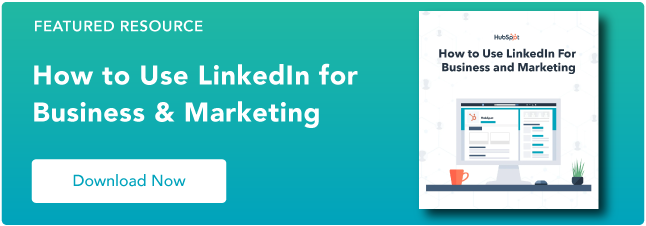When you get a recommendation from someone you respect and admire, you may feel honored and want to return the favor. But figuring out how to write a LinkedIn recommendation that is specific, honest, succinct, and helpful isn’t easy.
Most people get stuck. You might not know how to start or what to say. But with some simple templates and tips, you’ll be writing stellar testimonials on LinkedIn for your favorite people.
Keep reading to learn how to write a LinkedIn recommendation. Then check out some recommendation examples and a quick recommendation letter template.
You can use these tools to write authentic and useful LinkedIn endorsements that can help move someone’s job search in the right direction. Let’s get started.
1. Explain the nature of your professional relationship.
That sounds really serious, but it’s simply a helpful piece of context that acts as an intro for your recommendation. Whether it’s a coworker you’ve worked closely with for years or a recent agency point of contact, it sets the stage for the reader to learn why you’re writing this recommendation.
For Example:
I’ve worked alongside Lisa for close to two years now.
2. Offer details about the position this person is working toward.
Are you recommending this person for their work in one position? Or are you writing about their work across multiple jobs they’ve held while you worked with them?
Either way, a great next step is to explain some of the notable parts of their job. It may feel strange — kind of like you’re listing out their job description. But this is helpful for anyone reading the recommendation, looking to get a feel for what they did in their job.
Resist the urge to create a laundry list of their job duties. If they’ve really worn that many hats, I recommend contacting them to see if there’s a certain part of their role they’d like emphasized over others.
For Example:
In those two years, I’ve seen her not only excel at the core elements of her job — like copywriting and copyediting — but also learn other tasks that extend well beyond the scope of her role. These include email marketing, event planning, and even championing our company’s internal communications.
3. Explain how they’ve grown at the company.
If this person reports (or once reported) to you, this aspect of a LinkedIn recommendation can go a long way. Explaining how the person you’re recommending has grown — either in their role or from one role to another — can show an ability to adapt as the organization expands.
Just be careful not to overstate any low points in the person’s career that can dilute the value of the growth you’re trying to highlight.
For Example:
Lisa has grown as quickly as our business has, and her willingness to learn and take on these new responsibilities is something sought-after in any professional.
4. Show how their contribution helped grow the team or company.
This could be an explanation of how their performance helped hit hard metrics. You could also talk about contributions like leading their teammates or fostering new initiatives.
For Example:
Lisa’s mastery of both her core role and extra projects have been critical to the company’s growth. In fact, her taking on internal company communication aligned with a sharp increase in employee happiness.
5. Explain what these achievements reveal about that person.
By now, you’ve included some specifics — so let’s explain what those specifics mean for the larger theme of your recommendation. Do the examples you’ve detailed reveal that person is hard-working? Ambitious? Great for team morale? Connect their accomplishments with their attributes.
For Example:
This rare mix of productivity and ambition sets a great example for the rest of the team. It also explains why everyone loves working with Lisa — no matter where they fall on the org chart.
6. End with a note about the personal aspect of working with them.
In this section, hit the message home with a mention of how you felt working with the person, your hopes for their career, or a prediction about their future.
For Example:
Lisa’s work has continued to pay dividends long past her tenure here and I still miss working with her every day. I can’t wait to see what she does with the next step in her career trajectory.
LinkedIn Recommendation Examples
Recommendation From an Employee
According to a 2021 SHRM report, over 40% of employees are looking for a new job. And according to a 2022 Gartner survey, 50% of employees have different employer expectations than they did before the pandemic.
Employee recommendations show that a stakeholder respects the opinions of the people they manage. It also shows how they lead from the bottom up.
In the recommendation below, a person discusses how their supervisor progressed at the company and how this person mentored them so they too could grow as an employee.
Example 1:
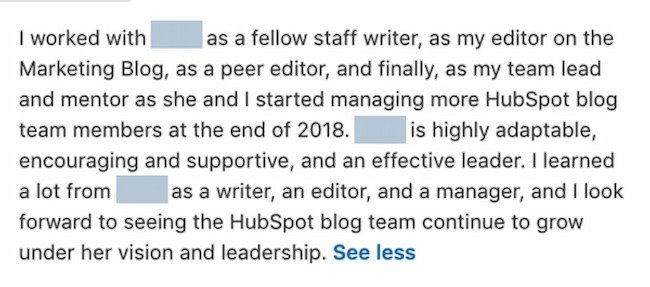
Why we like this LinkedIn recommendation:
This recommendation shows how the relationship between employee and manager evolved over time. Work relationships that shift from peer to manager can be tough. They can sometimes create power struggles, miscommunication, and more. But this LinkedIn recommendation example highlights mutual respect, care, and professional growth.
Example 2:

Why this is a good LinkedIn recommendation:
Soft skills can be difficult for recruiters and employers to assess. So the recommendation above is valuable because it talks about a manager/employee relationship that was essential to this employee. This gives them a sense of how this manager might engage their new team.
Example 3:

Why we like this LinkedIn recommendation:
An authentic recommendation is much more useful than a form letter. The letter above shows how this manager balanced kindness, critique, and composure on his team.
Recommendation from an Employer
Employer recommendations may be a replacement or a complement to the job requirements for many positions. This makes employer recommendations an important LinkedIn addition. Unlike most standard letters of recommendation, LinkedIn letters are usually short and to the point. Instead of a full page, most are short but dense paragraphs like the examples below.
For example, in this recommendation, an employer explains how an employee progressed and executed projects that made a big impact on their company.
Example 1:
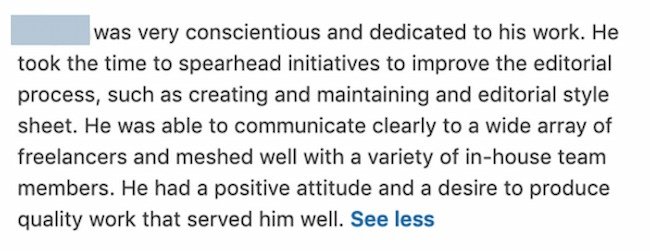
Why we like this LinkedIn recommendation:
This letter jumps immediately into specific job functions, technical skills, and soft skills. A quick scan of this letter can show any employer what this person does best and how those skills can translate to other jobs or employers.
Example 2:

Why this is a good LinkedIn recommendation:
Connecting actions to outcomes can make it easier for prospective employers to understand the value an employee can bring to their team. This quick letter clearly connects what this new hire did, how she approached changes and the results that came from her actions.
Example 3:

Why we like this LinkedIn recommendation:
This recommendation letter uses industry-specific terms to show the activities and outcomes this employee was responsible for. This makes it easy for employers to understand how that performance could translate to their business and team.
Recommendation from a Coworker
Over 20% of LinkedIn users are 18-24 years old. This means that many LinkedIn users are recent graduates who might have limited job experience.
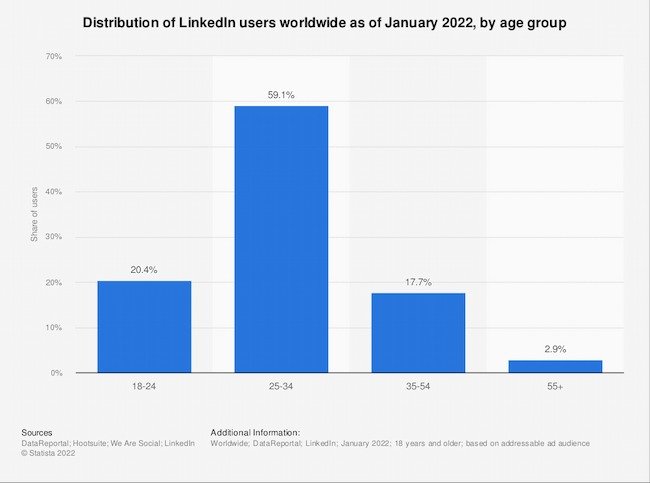
Employers are looking to LinkedIn for a sense of your commitment, engagement, and soft skills at work. Coworkers are a great source to highlight these areas. Let’s look at some excellent coworker recommendations from LinkedIn.
Example 1:

Why we like this LinkedIn recommendation:
This letter quickly highlights how long these two have worked together, what they did, and what this candidate’s strongest soft skills are. It stays positive but also showcases how this person responds to pressure.
Example 2:
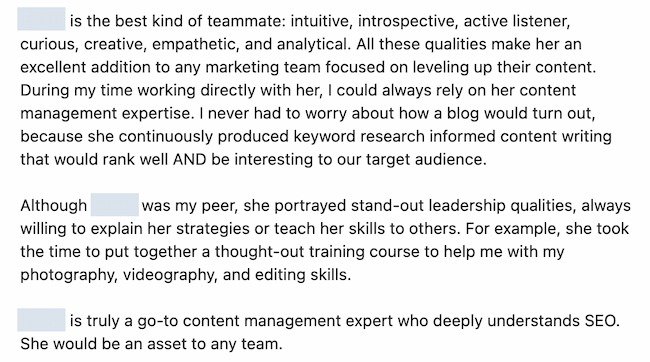
Why this is a good LinkedIn recommendation:
A recommendation full of job-specific details that emphasize abilities is always useful. At the same time, this letter shows off qualities that may not come into a job interview, depending on the role. By outlining teaching skills and continuing education, this recommendation shows potential employers how this candidate is preparing for the future.
LinkedIn Recommendation Sample (for a Manager)
Now, writing a LinkedIn recommendation can seem easy, but it’s not. What if the employee you’re recommending is your superior? This can make it more difficult to recommend the person — even if you’re saying stellar things about them.
Here’s a sample LinkedIn recommendation — written in full — that a manager would be proud to receive.
I’ve worked for Lisa for two years. During that time I’ve seen her quickly take on new responsibilities while making time to teach these new skills to her employees.
By inheriting tasks like campaign analytics and email A/B testing — both of which extend beyond the scope of our team — she’s made our department much more agile and set me up for promotion last month. Lisa is a great person and manager, and her next employer will be lucky to have her.
Now proofread, and hit send. Remember, the person you’re writing your recommendation for can review and request changes. So, you’ll have a chance to make changes and submit a recommendation that they’ll appreciate.
Write a Recommendation on LinkedIn Today
LinkedIn isn’t just job hunting and your professional reputation. It’s about building relationships. The sooner you start writing recommendations with the steps above, the better your professional relationships can be.
Editor’s note: This post was originally published in July 2018 and has been updated for comprehensiveness.
![]()

![Free Guide: How to Use LinkedIn for Business, Marketing, and Networking [Download Now]](https://i4lead.com/wp-content/uploads/2022/10/ddd33609-1733-44d2-a811-a5435b201ffe.png)
